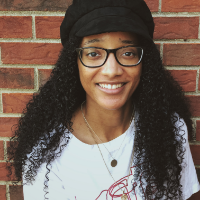We Don't All Look Like Meghan Markle

In light of the recent events surrounding Meghan Markle, I couldn't help but notice how people like to categorize Meghan and anyone else in the public eye into racial boxes, boxes that everyone else thinks they should be in, but the people who it really matters to. Being biracial doesn't always look the same. It never fits the "prototype." We all have different features and come in a variety of different shades. It can be irritating to hear people say, "Well I didn't expect mixed people to come out insert skin shade like that!"
The stigma that mixed-race people should look a certain way, makes it that much harder for those who struggle with their racial identity. And it needs to stop.
Biracial's that have similar complexion and features like Meghan Markle sometimes can be considered "white-passing" while others that have darker complexions like actress Laura Harrier are seen as "black." According to the "one-drop rule," both are actually Black women and therefore there should be no further argument on the matter.
However, the "one-drop rule" is an outdated rule that claimed any person who had an ounce of black ancestry was considered black. It was a way to socially and racially classify people, particularly slaves who intermarried. And here we are in 2021 and people still want to gatekeep mixed people to fit into their own criteria of what they should look like.

Actress/Singer Destiny Ryan is another example of someone who comes from a similar racial background as myself, her mother is biracial with black ancestry and her father is African-American. However, many wouldn't even consider her anything but black because of her skin tone and facial features. This begs the question, does the world believe that mixed people are all light-skinned with Eurocentric features? And what about those who have non-black or white admixture, what then?

Growing up I never had issues with my mixed background, my mother is biracial and I have an African-American father. I remember hearing little comments like "You're an Oreo, black on the outside but white on the inside" or "You don't act like a black girl" which was always crazy to me. First, what does "acting like a black girl" even mean? Countless friends of mine who are black women, have told me how annoying this was to be put into a box because people perceived them to "act" a certain way or listen to certain music that represented their African-American heritage. And that isn't fair. You want to know what else isn't fair, putting mixed people in those same similar boxes except take out the "black girl" and insert any other non-white race and it has similar feelings. It wasn't until I entered college that my identity became a factor for me to question.
For the first time, I didn't want to talk about my racial background unless something asked me about it. I just let them think whatever until they wanted to go into specifics about my race. I wasn't ashamed of my background but being around other mixed people I felt like my racial background wasn't apparent enough to warrant getting more specific questions. And I know I am not the only mixed girl who has had similar experiences or thoughts. When you look more like one race than the other and want to celebrate both but people only focus on the most apparent one, it can mess with your head. And make you feel like you're shoving aside the other half of yourself.
I stumbled onto a website for mixed people of various backgrounds called Mixed Race Faces. What Mixed Race Faces aim to do is create a space where people from different cultures and racial backgrounds can openly talk about their struggles and joys of being biracial and multiracial. There were a couple who had either one or both parents as biracial and talked about coming to terms with what to label themselves with. One of the profiles spoke on the issue of bias towards mixed people, something I know a lot of people can relate to.
I do think there is a bias towards mixed raced people, especially if you don’t have one White and one Black parent. It’s like if you’re not the stereotypical mixed race you just are not recognized as mixed in their eyes. @_jadeth @mixedracefaces
Having the problem of not looking mixed enough. It's quite frustrating but then sometimes people clock my "other" pretty fast while others don't question it. It was and still at times can be frustrating because part of me wants to scream out "I am a mixed person" but then I feel immediate guilt because there are bigger problems out there than people not always getting my mixed background. At the core of everything, I never felt black enough or white enough either. It was always somewhere in the middle.
What I've had to learn is being okay, actually more than okay with what I look like, and not let strangers' perception of what my race could be, affect my mindset.
All this to say, please don't put mixed people in boxes, let them identify themselves for who they are not what you perceive them to be. We can look like the Meghan Markle's of the world, The Rock, Vice President Kamala Harris, or even Keanu Reeves.




